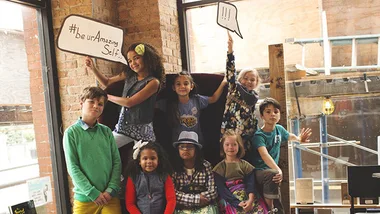As a mother of four daughters, one born with Down syndrome, I could relate to Mr Farnell when he said, “I don’t think any parent wants a son with a disability. Parents want their children to be healthy and happy and be able to do everything that every other children do”.
We too were scared, didn’t know what to do, were in turmoil, in shock. But abandoning your child and asking for your money back? Returning spoiled goods to the supermarket for a refund I admit to doing, but children are not products to be bought and returned if imperfect or don’t meet your expectations.
My children have been exposed to the Gammy saga along with millions of others.
Over the weekend, my eight-year-old daughter asked; “Mummy, my friends said that a mother in Thailand left her shopping trolley at the airport with her baby in it because it had a disability and she didn’t want it. Why?” My 12-year-old with Down syndrome was in the car listening in to the conversation.
These perceptions limit the potential of people with a disability more than the disability itself. People need to know that given the right learning environment and opportunities, people with Down syndrome can lead happy and healthy lives, can have careers, can travel, can live independently, can get married, can contribute economically to Australia’s future and actually enhance society.
Twelve years ago our baby arrived as planned. Not resembling her blonde blue-eyed sister, we lovingly joked that she must have been delivered by the milkman. On the second day our world was turned upside down when we were told that our baby had Down syndrome.
I remember every minute of that day vividly – the shock, anger and disappointment. But whilst tears flowed from me, so too did the intense love I had for my little baby. The same basic human emotions that drive most parents – unconditional love and protection at all costs.
Back in 2002 I was determined to change the status quo for my daughter to have a life full of health, happiness and respect. But even now, we come across varying levels of expectations for Alle. Two weeks ago my response to a questions on where she goes to school was met with surprise. “Your daughter with Down syndrome goes to a normal school like her sisters?”
Five years ago, after being unable to find an appropriate dance class to meet my daughter’s learning needs, I set up e.motion21 – a not-for-profit volunteer organisation that provides an Australian-first dance and fitness program designed specifically for children and young adults with Down syndrome. Our vision is to enhance lives and change perceptions of Down syndrome within society through dance, fitness and performance. We achieve this by:
1. Moving bodies;providing programs to children and young adults with Down syndrome in supportive and social environments tailored to meet their specific learning needs.
2. Moving boundaries; engaging positively with individuals, families and communities through our programs, performances and media to uncover new potential, promote understanding and raise expectations.
Our annual concert is a highlight of the year for our dancers, their families and the wider community. The joy, skill and creative expression shared is truly inspiring. This year’s theme is ‘Around the World’ and is quite fitting as international role model Lauren Potter will be co-hosting this special event.
Lauren, a young woman with Down syndrome has achieved great success with the popular television show, Glee but is also a strong activist for individuals with developmental disabilities and a dedicated anti-bullying campaigner. In November 2011, President Barack Obama appointed Potter to the Presidents Committee for People with Intellectual Disabilities, where she advises the White House on issues related to that population.
As an amazing global role model, Lauren’s presence in Australia will not only thrill our children with Down syndrome but raise their expectations, and their parents and the Australian public about what people with Down syndrome can achieve if given the chance!
Stories like Gammy’s continue to highlight to me the importance of our work in moving boundaries. Lauren Potter’s involvement is even more profound now as she exemplifies the success that people with Down syndrome can achieve if given the opportunity.
Cate Sayers is the CEO and Founder of www.emotion21.org.au.

.jpg?resize=380%2C285)

